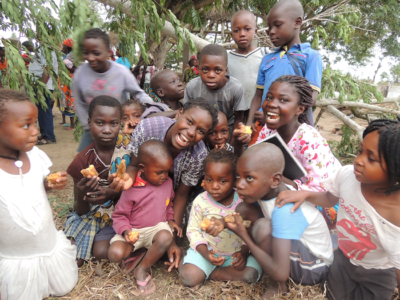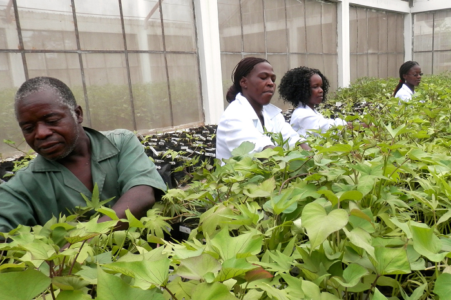Over the past decade, the International Potato Center (CIP) and partners in 16 African countries have delivered nutritious orange-fleshed sweetpotato to almost six million smallholder farming households. Through a combination of breeding, seed systems, farmer training and nutrition education, CIP-led interventions have improved the lives of over 25 million people—more than the population of Australia.

The latest CIP intervention, SweetGAINS (Genetic Advances and Innovative Seed Systems), seeks to accelerate and expand the development and dissemination of nutrient rich, climate-resilient sweetpotato varieties to benefit millions more African families. Over the next three years, SweetGAINS, funded by the Bill & Melinda Gates Foundation, will employ cutting-edge science and methodologies through CIP’s regional breeding platforms in Mozambique and Uganda to modernize national sweetpotato breeding programs on the continent. At the same time, it will catalyze the creation of seed systems that deliver quality sweetpotato planting material to resource-poor farmers in Africa.
Launched in early October 2019, SweetGAINS activities will be focused in seven African countries: Ethiopia, Malawi, Mozambique, Rwanda, Tanzania Uganda and Zambia. It will build upon the achievements of earlier BMGF investments, including phases I and II of the Sweetpotato action for security and health in Africa project, the Genomic tools for sweetpotato improvement project, and the Program for emerging agricultural leaders. Together, those initiatives enhanced the breeding, adoption and consumption of improved sweetpotato varieties in Africa, and supported the development of foundational tools to help scientists harness the nutritious crop’s potential for years to come.
Just 125 grams of orange-fleshed sweetpotato can provide the vitamin A needs of a child under five, protecting him or her against an array of health problems. CIP and national breeding programs have developed and release dozens of high-yielding, orange-fleshed sweetpotato varieties—rare in Africa a decade ago—that have contributed to the food and nutrition security of millions.
“SweetGAINS will build upon earlier achievements to accelerate and improve the development and dissemination of climate-resilient, market-accepted sweetpotato, including orange- and the more common white- and yellow-fleshed varieties. It will bring a customer-needs-driven, industry perspective to sweetpotato breeding and promote aspects such as operational excellence,” said Hugo Campos, CIP research director and SweetGAINS project leader.
“Breeding system approaches will reduce the time it takes to develop elite sweetpotato clones from eight years to five, and deliver improved varieties whose average productivity rates are as much as 60 percent higher than those grown by most farmers,” Campos explained. “SweetGAINS will also promote hybrid breeding approaches that could enable genetic gains (increased yields and quality) that have traditionally taken 36 years to achieve in just six years. Scientists will use a greater understanding of sweetpotato genomics and genome-sequencing tools and approaches to enhance breeding efficiency.”

The project will promote a variety development approach that considers the preferences of men and women farmers, consumers, traders and processors. Breeders will use product profiles for given market segments to ensure that the nutritious, resilient and high-yielding varieties they develop also have the taste, texture, cooking quality and other characteristics that farmers and consumers want. Multi-disciplinary, gender-responsive teams will help breeders ensure that released varieties respond to the needs and constraints of women and men, to ensure they are widely adopted.
The project will be guided by a community of practice that brings together scientists of varied disciplines from CIP, national agricultural research institutions from target countries and partner institutions that include North Carolina State University, Boyce Thompson Institute, Michigan State University, and University of Tennessee. CIP will also work with private sector partners, with support from development partners, to catalyze value chains and increase market demand and consumption of nutritious varieties.
SweetGAINS is aligned with commitments made under the Scaling Up Nutrition movement in sub-Saharan Africa. It is also complemented by other projects, including a major investment by the UK Department of International Development to scale up delivery of nutrient-rich, climate-resilient staple crops—including sweetpotato—to populations that suffer micronutrient deficiencies. By working with other donor-funded projects and an array of partners, SweetGAINS will improve rural and urban consumers’ access to more affordable, healthy food while transforming the lives of smallholder farming families.
Read the project profile
https://hdl.handle.net/10568/106838
